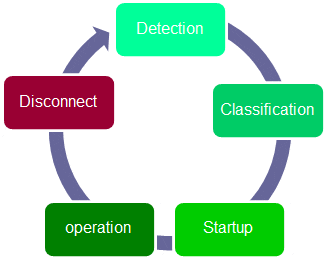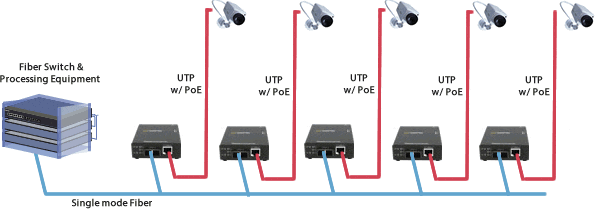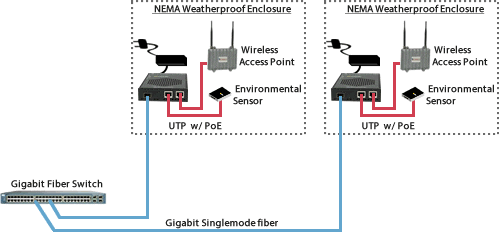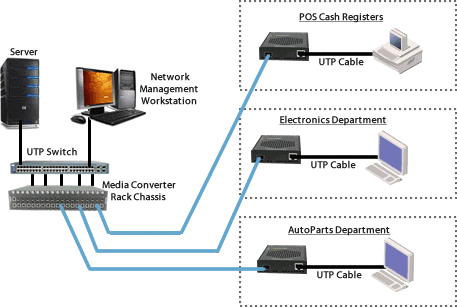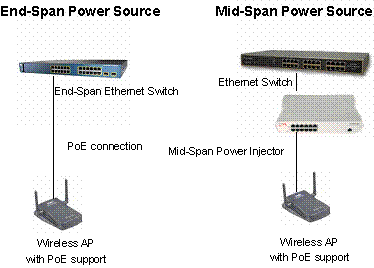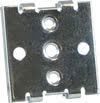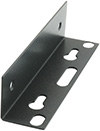Conversores de Medios Hi-PoE S-1110HP-SFP-XT
Conversión de Medios de Fibra y PoE compatible con IEEE 802.3bt
- 10/100/1000Base-T a fibra 100/1000Base-X
- 1 o 2 ranuras vacías para Cisco y otros estándares SFP de la industria
- Suministra alimentación IEEE 802.3bt Hi-PoE PSE (hasta 100 W)
- Compatible con dispositivos IEEE 802.3af PoE e IEEE 802.3at PoE+ PoE
- Puertos 10/100/1000Base-T PoE dobles o simples
- Funciones avanzadas: PD Reset, Fiber redundancy, Smart Link Pass-Through, Fiber Fault Alert, Auto-MDIX y Loopback
- Intervalo ampliado de temperaturas de funcionamiento -40ºC a +75ºC
Los Conversores de Medios de Fibra S-1110HP-XT de Perle conectan de manera transparente el cobre a la fibra y proporcionan hasta 100 vatios de potencia PSE Hi-PoE compatible con IEEE 802.3bt a dispositivos compatibles con los estándares. Los equipos utilizados en gestión del tráfico, tuberías de petróleo y gas, seguimiento del clima, aplicaciones industriales y exteriores deben funcionar a temperaturas que las fuentes de alimentación comerciales no pueden resistir. Con una temperatura de funcionamiento de -40ºC a +75ºC, este conversor de medios Hi-PoE es ideal para utilizarlo con dispositivos industriales que se exponen a entornos duros y temperaturas extremas, como cámaras de seguridad PTZ con calentadores, puntos de acceso inalámbricos 802.11ax/ac, alarmas, controladores de tráfico, sensores y dispositivos de seguimiento.
Los Conversores de Medios Hi-PoE de Perle están clasificados como Equipo de Suministro de Energía (PSE). Al usar cables UTP estándar que transportan datos Ethernet, los conversores de medios Hi-PoE de Perle suministran energía a dispositivos alimentados (PD) compatibles con la norma IEEE 802.3bt PoE (hasta 100 W de potencia) o soluciones previas a la norma que incluyen UPoE, 4PPoE, PoE++, UltraPoE, PoE de 4 pares, etc. Como esta norma es totalmente compatible con las normas existentes IEEE 802.3af PoE e IEEE 802.3at PoE+, los PD también serán compatibles. El conversor de medios de fibra S-1110HP-XT cuenta con puertos RJ45 10/100/1000Base-T individuales o duales para alimentar uno o dos PD por conversor. Obtenga más información sobre PoE
Y, con uno o dos puertos de transceptor vacíos en el conversor de medios de fibra S-1110HP-SFP-XT, se pueden cumplir los requisitos de configuración de red flexible utilizando una variedad de transceptores suministrados por Perle, Cisco, u otros fabricantes de SFP que cumplen con MSA.- extienda la vida útil de equipos no basados en fibra con la transmisión de datos desde dispositivos 10/100/1000Base-T a través de fibra 100/1000Base-X
- amplíe la distancia de una red existente mediante la conexión de un cable CAT5/6/7 a fibra multimodo o monomodo
- proteja los datos de Ethernet del ruido e interferencias electromagnéticas EMI interconectando sus dispositivos de cobre-Ethernet a través de fibra
Los administradores de redes pueden "verlo todo" con las prestaciones avanzadas de Perle, como Auto-Negotiation, Auto-MDIX, Link Pass-Through, Fiber Fault Alert y Loopbac. Esto permite una mayor eficiencia a la hora de resolver problemas y un menor mantenimiento in-situ. Estas funciones de ahorro de ahorro de costes y tiempo, unidas a la garantía de por vida y el soporte técnico gratuito en todo el mundo, convierten a los conversores de medios PoE S-1110HP-SFP-XT de Perle en la elección inteligente para los profesionales de TI.
Características del Conversor de Medios Hi-PoE S-1110HP-SFP-XT
| Power Over Ethernet (PSE) | Totalmente compatible con IEEE 802.3bt Tipo 3 y 4 PSE Realiza la función de equipo proveedor de alimentación eléctrica (Power Sourcing Equipment, PSE) en 1 o 2 puertos UTP para dispositivos que cumplen con IEEE 802.3bt. Todos los modelos admiten dispositivos PD de tipo 1 (PoE), tipo 2 (PoE+), tipo 3 (Hi-PoE) y tipo 4 (Hi-PoE) |
| Administración avanzada de energía |
|
| Restauración de la alimentación del PD | Esta función configurable, idónea para restablecer la alimentación de equipos remotos, realiza un restablecimiento momentáneo de la alimentación del dispositivo alimentado (PD) que se encuentre conectado. Cuando se activa, el conversor de medios, al perder el enlace RX de fibra, desactiva la corriente de salida de PSE hacia el dispositivo PD durante 2 segundos y luego vuelve a activar la alimentación y la mantiene activada hasta que se produzca otra pérdida de enlace RX de fibra (tras su restablecimiento). Cuando se desactiva, la pérdida del enlace RX de fibra no tiene ningún efecto en la alimentación PSE al dispositivo o dispositivos PD. |
| Compatibilidad con dispositivos alimentados | PDs Tipo: 1, 2, 3 y 4 PD Clase: 1, 2, 3, 4, 5, 6, 7, 8 Admite ambas conexiones PD de firma simple y dual |
| Configuraciones Multipuerto |
|
| Redundancia de fibra | Cuando está habilitado en modelos de doble fibra, el convertidor de medios trata a la Fibra 1 como la principal y, si el enlace falla, el enlace de la fibra se cambia a la Fibra 2 dentro de 50 ms. |
| Fibra Primaria Redundante | Si la función "Redundancia de fibra" también está habilitada, el enlace de fibra 1 primario se monitorea continuamente y si se restaura durante al menos 6 segundos, el enlace se cambiará de nuevo desde el puerto de fibra 2 secundario al puerto de fibra 1 primario. |
| Correa de alivio de tensión | Incluido con todos los modelos, se proporciona una correa de alivio de tensión para garantizar una conexión de alimentación sólida y segura al convertidor de medios. Ideal para áreas que pueden estar expuestas a vibraciones. |
| Sensor de Velocidad SFP | Detecta automáticamente si un Gigabit o SFP de fibra Fast Ethernet se ha insertado y se ajusta en consecuencia. |
| Auto-Negotiation (802.3u) | El convertidor de medios soporta autonegociación. La interfaz de fibra 1000Base-X negocia según las cláusulas 802.3 37. La 10/100/1000Base-T negocia según las cláusulas 28 y 40 de 802.3. La 1000Base-X se conectará con su compañero una vez que se alcance el máximo común denominador (HCD) Y el cobre se ha vinculado con su socio. El 1000Base-X continuará su ciclo a través de la negociación transmitiendo un fallo remoto de fuera de línea (siempre que esté habilitado a través de la configuración del interruptor) hasta que el cobre esté conectado y los HCD coincidan. El conversor de medios admite la negociación automática de dúplex completo, semidúplex, falla remota, pausa de dúplex completo, pausa asimétrica y Auto MDI-X. |
| Auto-MDIX | Auto-MDIX (cruce automático de interfaz dependiente del medio) detecta la señalización de la interfaz Ethernet de cobre para determinar el tipo de cable que se encuentra conectado (de paso directo o de cruce) y configura automáticamente la conexión cuando está activado. El conversor de medios también puede realizar correcciones en el caso de un par en el que se hayan intercambiado los hilos. El conversor de medios se ajustará hasta 120 ns de sesgo de retardo entre los pares 1000Base-T. |
| Smart Link Pass-Through | Cuando el interruptor de modo de enlace se coloca en el modo de paso directo de enlace inteligente, el puerto Ethernet de cobre reflejará el estado del puerto del convertidor de medios 1000Base-X. Esta función se puede usar tanto si la negociación automática de fibra está habilitada como si está deshabilitada. |
| Alerta de Falla de Fibra | Con Fiber Fault Alert (alerta por fallo de fibra), se informa del estado del receptor 1000Base-X al transmisor 1000Base-X. Esto proporciona notificación de fallos al dispositivo asociado conectado a la interfaz 1000Base-X del conversor de medios. Si el transmisor 1000Base-X está desactivado como resultado de este fallo, se activará periódicamente para permitir que se borre el estado en el caso de que el dispositivo asociado de 1000Base-X utilice una técnica similar. Esto elimina la posibilidad de bloqueos que se produce en algunos conversores de medios. Sólo es aplicable cuando está desactivada la negociación automática. |
| Pause (IEEE 802.3xy) | La señalización Pause es una función de IEEE que suspende temporalmente la transmisión de datos entre dos dispositivos en el caso de que uno de ellos esté sobrecargado. El conversor de medios admite la negociación de pausa en la conexión 10/100/1000Base-T y en la conexión de fibra 1000Base-X.
|
| Duplex | Se admite funcionamiento dúplex y semidúplex. |
| Paquetes Jumbo | Transparente a paquetes jumbo de hasta 10 KB. |
| VLAN | Transparente a paquetes con etiqueta de VLAN. |
| Remote Loopback | Capacidad para realizar un bucle en la interfaz de fibra 1000Base-X. |
¿No es lo que busca? Vea todos los Conversores de Medios de Fibra de Perle.
¿Necesita ayuda? Contacte con Perle Systems.
Specifications
HTSUS Number:
8517.62.0020
UNSPSC Code:
43201553
ECCN:
5A991
Power
Input Supply Voltage
52 - 57 vDC
Power Consumption
- 1 x 10/100/1000Base-T port models: 4 watts
- 2 x 10/100/1000Base-T port models: 4.7 watts
Note: for the HP PoE SFP models the numbers above don’t include the SFP power consumptions
Power Over Ethernet (PSE)
up to 100 watts per port
Power Connector
2-Pin pluggable terminal block
Indicators
Power (PWR)
This green LED is turned on when power is applied to the media converter. Otherwise it is off. The LED will blink slowly when either fiber port is in Loopback test mode. The LED will blink quickly if there is a hardware failure where the reason code can be identified through a combination of FDF,LKF, FDC and PSE indicator LEDs
Fiber link on / Receive activity (LKF 1/2)
- This green LED is operational only when power is applied. The LED will blink along with transmit/receive data on the fiber port.
- If a loss of link on the copper port results in a Link Passthrough condition to the fiber port, this LED will blink at a rate of once every 2 seconds until the condition is cleared.
Copper link on / Receive activity (LKC 1/2)
- This green LED is operational only when power is applied. The LED will blink along with transmit/receive data on the 10/100/1000 UTP port
- If a loss of link on the copper port results in a Link Passthrough condition to the fiber port, this LED will blink at a rate of once every 2 seconds until the condition is cleared.
Fiber Duplex (FDF 1/2)
This green LED is operational only when power is applied. The LED is on when the 10/100/1000Base-X link is operational in full duplex mode. The LED is off when in half duplex. If the Auto-Neg switch is turned off, this LED will always be on
Copper Duplex (FDC 1/2)
This green LED is operational only when power is applied. The LED is on when the 10/100/1000Base-T link is operational in full duplex mode. The LED is off when in half duplex
100/1000
This multi-color LED is operational only when power is applied. The LED is green when the speed of the copper ethernet port is running at 1000 Mbps. The LED is yellow when the speed of the copper Ethernet port is running at 100 Mbps. The LED is off when in 10 Mbps.
PSE Status (PSE 1/2)
- GREEN — Solid: The PSE has successfully detected a compliant PD and is applying power over the UTP (for legacy pin out simply show active power when applied)
- YELLOW — Solid: The PSE is not active. This means the PSE has been configured to provide power, but the PD is :
- Not connected
- Has not detected a compliant PD and is not applying power
- PSE has turned off power for Reset function
- OFF — PSE function switch disabled
- RED — Blinking: Error Conditions
- Capacitance too High — 1 blink
- Resistance too Low or short circuit — 2 blinks
- Resistance too high or open circuit — 3 blinks
Switches - accessible through a side opening in the chassis

Auto-Negotiation (802.3u)
- Enabled (Default) - The media converter uses 802.3u Auto-negotiation on the 10/100/1000Base-T interface. It is set to advertise full duplex, half duplex, pause and remote fault capabilities.
- Disabled - The media converter sets the port according to the position of the speed and duplex switches.
Link Mode
Link Mode provides a transparency to the state of the copper link allowing for simplified trouble shooting from the devices connected to the media converter.
Normal (Default — Up)
- With Fiber Auto Negotiation enabled when the copper link goes down the 1000Base-X link is brought down. The 1000Base-X link will advertise Remote Fault (Link Fault).
- With Fiber Auto Negotiation disabled the state of the copper link has no effect on the 1000Base-X link.
Smart Link Pass Through (Down)
- With Fiber Auto Negotiation enabled the behavior is as follows. When the copper link goes down the 1000Base-X link is brought down. The 1000Base-X link will advertise Remote Fault (Link Fault). When Remote Fault (Link Fault) is received on the 1000Base-X interface the copper transmitter will be turned off. When the copper receiver is off the 1000Base-X transmitter will be turned off. When the 1000Base-X receiver goes off the copper transmitter will be turned off.
- With Fiber Auto-Negotiation disabled the behavior is as follows. When the copper receiver is off the 1000Base-X transmitter will be turned off. When the 1000Base-X receiver goes off the copper transmitter will be turned off.
Fiber Fault Alert
- The Fiber Fault Alert switch has meaning when Auto-Negotiation is disabled
- Enabled (Default - Up)
When the 1000Base-X receiver is off the 1000Base-X transmitter is turned off. Periodically the 1000Base-X receiver will be turned on for a short period to allow the condition to clear if the 1000Base-X link partner is using a similar feature. - Disabled (Down)
Loopback
- The media converter can perform a loopback on the 1000Base-X fiber interface.
- Disabled (Default - Up)
- Enabled - The 1000Base-X receiver is looped to the 1000Base-X transmitter. The copper transmitter is taken off the interface.
Speed Copper
- 100 (Default)
- 10
Duplex Copper
- Full (Default)
- Half
Fiber Negotiation
- Up: The Media Converter will negotiate Ethernet parameters on the fiber connection. This will ensure that the most optimal connection parameters will be in effect. If connecting to another Perle Media Converter, this parameter should be set to Auto. The Media Converter Module will advertise 1000Mbps, Full and Half Duplex, no Pause.
- Down: The Media Converter Module’s fiber will be fixed to 1000Mbps, Full Duplex.
Auto-MDIX (Internal Strap)
- If Auto-Negotiation (802.3u) is enabled, the media converter determines the current cable pinout to use on the copper interface. If Auto-Negotiation (802.3u) is disabled the Media converter will use the RX Energy method on the copper interface to set the port MDI or MDIX whichever is appropriate.
- Enabled (Default) - Either a straight-through or crossover type cable can be used to connect the media converter to the device on the other end of the cable.
- Disabled - If the partner device on the other end of the cable does not have the Auto-MDIX feature a specific cable, either a straight-through or crossover will be required to ensure that the media converter's transmitter and the partner devices transmitter are connected to the others receiver. The Media converter's 100Base-TX port is configured as MDI-X with this switch setting.
PSE Power
- Settable for each UTP port available.
- When enabled (UP), the media converter will perform a Power Sourcing Equipment (PSE) function as per IEEE802.3bt standard.
- Default is 'enabled'
PD Power Reset
- This is a technique to perform a power reset on a PD device(s) attached.
- When enabled (down), the media converter will upon loss of link on any fiber port, turn off PSE output power to the PD device(s) for 2 seconds then turn the power back on. The power remains on until any fiber link transitions from up to down again.
- With Passthrough enabled (Link Mode enabled and Fiber Auto-Negotiation enabled) , a loss of link on the fiber resulting from a loss of link on the copper, a PD Power Reset till still occur.
- When PD Power Reset disabled, loss of fiber link has no effect on PSE power to the PD device(s).
PoE power vs Ethernet CAT
- CAT3 and above for PoE power up to 15.4 watts
- CAT5 and above for PoE power between 15.4 watts and up to 30 watts
- CAT6 and above for PoE power between 30 watts and up to 100 watts
Connectors
10/100/1000Base-T
- RJ45 connector
- 2 pair CAT5, EIA/TIA 568A/B or better cable for 10/100.
- 4 pair CAT5 UTP cable for Gigabit.
Magnetic Isolation
1.5kv
Small Form Factor Pluggable (SFP) slot
- SFP slot models: Empty slot for 1000Base-X or 100Base-X SFP modules supplied by Perle, Cisco or other manufacturers of MSA compliant SFPs.
- Hot insertion and removable (hot swappable).
Filtering
Filtering
1024 MAC Addresses
Frame Specifications
Buffer
1000 Kbits frame buffer memory
Size
Maximum frame size of 10,240 bytes -- Gigabit
Maximum frame size of 2048 bytes -- Fast Ethernet
Environmental Specifications
Operating Temperature
-40°C to 75°C (-40°F to 167°F)
Storage Temperature
-40°C to 85°C (-40°F to 185°F)
Operating Humidity
5% to 90% non-condensing
Storage Humidity
5% to 95% non-condensing
Operating Altitude
Up to 3,048 meters (10,000 feet)
Heat Output (BTU/HR)
- 1 x 10/100/1000Base-T port models: 13.65 BTU/hr
- 2 x 10/100/1000Base-T port models: 16 BTU/hr
MTBF (Hours)*
324134 Hours
*Calculation model based on MIL-HDBK-217-FN2 @ 30°C
Chassis
Metal with an IP20 ingress protection rating
Mounting
Din Rail Kit
Optional
Rack Mount Kit
Optional
Product Weight and Dimensions
Weight
0.4 Kg, 1.0 lbs (no power adaptor)
Dimensions
150 x 95 x 26 mm, 5.9 x 3.7 x 1.0 inches
Packaging
Shipping Weight
0.56 kg, 1.2 lbs
Shipping Dimensions
300 x 200 x 70 mm, 11.81 x 7.87 x 2.75 inches
Regulatory Approvals
Emissions
- FCC Part 15 Class A, EN55022 Class A
- CISPR 22 Class A
- CISPR 32 / EN 55032
- EN61000-3-2
Immunity
CISPR 35 / EN 55035
Electrical Safety
- UL/EN/IEC 62368-1 (previously 60950-1)
- CAN/CSA C22.2 No. 62368-1
- CE
Application Diagrams
Gigabit Fiber to IP Cameras
Connect 10/100/1000 IP Cameras to Gigabit Backbone
Extend the reach to IP cameras using fiber media converters. Security cameras are typically installed in remote locations throughout a facility. For cameras that are in the ceiling or other inaccessible areas like rooftops, light poles, along fences, pipelines and transit routes, the cost of bringing electrical power to each camera is eliminated by powering the equipment through the UTP cable using a PoE media converter. Cameras with features like Pan-Tilt-Zoom ( PTZ), heaters, de-icers, or blowers generally require higher power (30-100 Watts), making the Perle S-1110HP PoE Media Converters the ideal solution.
Fiber is run from an existing data closet to an area with access to power. The Hi-PoE Media Converter can be powered by 57vDC or standard 100 to 240 AC power. The media converter is attached to the power supply and the fiber cable. Copper (UTP or STP cable) Ethernet can be extended another 100 meters to the IP camera. The Hi-PoE Media Converter is converting the data from fiber to copper, adding power and transmitting it to the security camera.
To simplify cabling, multiport PoE media converters enable chaining, with a fiber uplink port and a fiber downlink port, of the fiber between media converters ( also known as a bus architecture ).
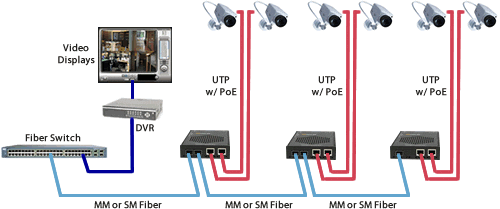
A second option is to have redundant fiber links for installations requiring fiber facility protection. There is an active fiber port and a protection fiber port that can support a fiber failure switchover of less than 50 milliseconds. The Hi-PoE media converter supplies power to the camera, and has power protection from an Uninterruptible Power Supply (UPS) battery back-up. In the event of a fiber cut and a loss of power, the camera continues to send data on the protection link.
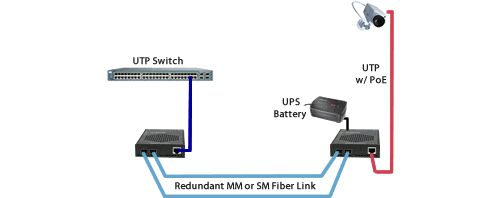
Gigabit Fiber to Wireless Access Points
Connect 10/100/1000 Wireless Access Points to Gigabit Backbone
Extend the reach to wireless access points ( AP ) using fiber media converters. When a company deploys a wireless network in their office or large warehouse, APs need to be set up throughout the facility to ensure complete coverage for reliability. The network manager will likely need to extend further than the 100 meters allowed by copper cable to reach many of the APs.
For wireless access points that require 30-100 Watts, such as those meeting the 802.11ax standard, 802.11ac standard or containing dual radios, the Perle S-1110HP PoE Media Converter is the ideal solution.
Fiber is run from an existing data closet to an area with access to power. The Hi-PoE Media Converter can be powered by 57vDC or standard 100 to 240 AC power. The media converter is attached to the power supply and the fiber cable. Copper (UTP or STP cable) Ethernet can be extended another 100 meters to the Wireless Access Point. The Hi-PoE Media Converter is converting the data from fiber to copper, adding power and transmitting it to the WAP.
To simplify cabling, multiport PoE media converters enable chaining, with a fiber uplink port and a fiber downlink port, of the fiber between media converters ( also known as a bus architecture ).
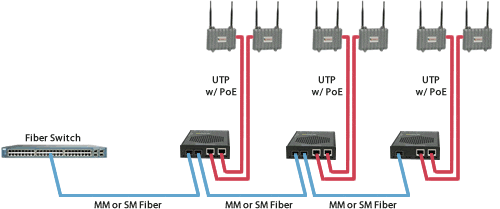
A second option is to have redundant fiber links for installations requiring fiber facility protection. There is an active fiber port and a protection fiber port that can support a fiber failure switchover of less than 50 milliseconds. The PoE+ media converter supplies power to the camera, and has power protection from an Uninterruptible Power Supply (UPS) battery back-up. In the event of a fiber cut and a loss of power, the camera continues to send data on the protection link.
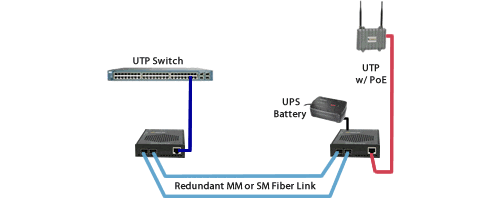
Gigabit Fiber to the Desktop / VoIP ( Voice over IP ) Phones
Connect 10/100/1000 workstations and VoIP Phones to a Gigabit Backbone
Extend the reach to your workstation and VoIP phones using fiber media converters. For VoIP phones that require 30-100 Watts power, such as those containing dual radios, the Perle S-1110HP PoE Media Converter is the ideal solution.
Fiber is run from an existing data closet to an area with access to power. The Hi-PoE Media Converter can be powered by 57vDC or standard 100 to 240 AC power. The media converter is attached to the power supply and the fiber cable. Copper (UTP or STP cable) Ethernet can be extended another 100 meters to the IP Phone. The Hi-PoE Media Converter is converting the data from fiber to copper, adding power and transmitting it to the IP Phone.
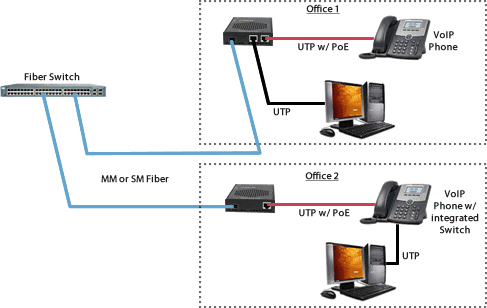
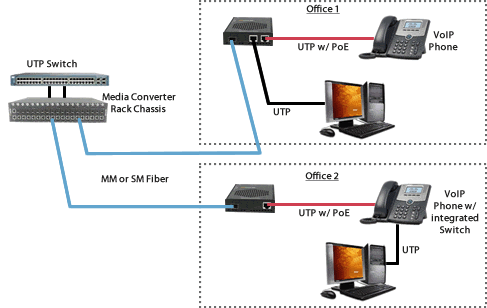
Redundant Dual-Fiber Uplink
Assured Fiber Uplink Connectivity for your critical equipment
When extending the reach of your critical Ethernet equipment using fiber media converters, a dual fiber port media converter with Fiber Redundancy capability provides a fast switch-over of link traffic from one fiber connection to the other converters.
Two modes of operation are possible.;
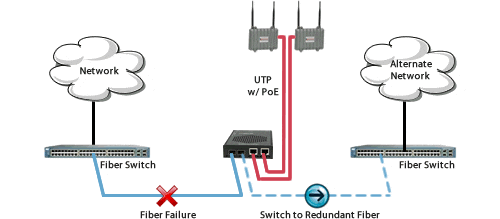
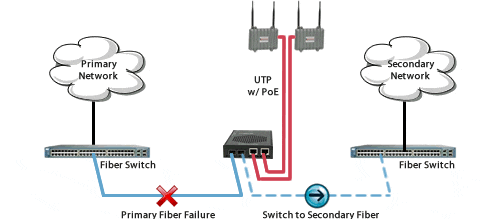
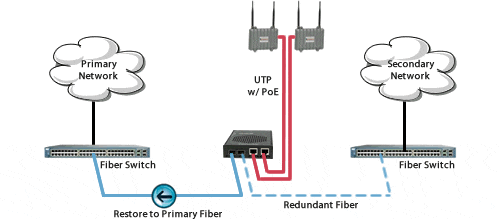
Single Mode / Single Fiber
Connect copper ports over a single fiber strand ( also referred to as “Bi-Directional” BiDi )
When Single Strand fiber is used, a pair of Single Fiber Media Converters is needed for the copper to fiber conversion. Perle Single Fiber Media Converters are also referred to as “Up/Down” models. For example the S-1110HP-SC05U (“Up”) and S-1110HP-SC05D (“Down”), shown below, must be used in pairs. An “Up” must be matched with a “Down” peer to deal with transmit and receive frequencies separately.
 S-1110HP-SC05US-1110HP-SC05D
S-1110HP-SC05US-1110HP-SC05D
The majority of installations for single mode fiber media converters are of the “dual connector” or “dual fiber” type where one fiber connection is used for transmit, the other for receive. These are physically “crossed” to match up the Transmit/Receive links.
However, to reduce costs, or where there are limits on available fiber, WDM technology may be utilized. WDM uses separate transmit and receive frequencies to communicate on a single fiber strand. WDM technology relies on the fact that optical fibers can carry many wavelengths of light simultaneously without interaction between each wavelength. Thus, a single fiber can carry many separate wavelength signals or channels simultaneously.
So remember, if Single Strand fiber is used, you will need an “Up” Media Converter on one side and a “Down” Media Converter on the other for copper to fiber conversion.
Haga clic en un número de pieza para obtener información sobre pedidos
Imagen del producto
Descripción
Cable de alimentación y número de producto

S-1110HP-SFP-XT - Gigabit Industrial Temperature Media and Rate Converter with Type 4 High-Power PoE PSE (up to 100W/port): 10/100/1000Base-T (RJ45) [100 m/328 ft] to 1000Base-X or 100Base-X - SFP Slot (empty). -40F to +167F (-40C to +75C) operating temperature support. Terminal block power connector for external power source

S-1110HP-DSFP-XT - Gigabit Industrial Temperature Media and Rate Converter with Type 4 High-Power PoE PSE (up to 100W/port): 10/100/1000Base-T (RJ45) [100 m/328 ft] to 1000Base-X or 100Base-X. Dual SFP Slots (empty). -40F to +167F (-40C to +75C) operating temperature support. Terminal block power connector for external power source

S-1110DHP-SFP-XT - Gigabit Industrial Temperature Media and Rate Converter with Type 4 High-Power PoE PSE (up to 100W/port): Dual 10/100/1000Base-T (RJ45) [100 m/328 ft] to 1000Base-X or 100Base-X - SFP Slot (empty). -40F to +167F (-40C to +75C) operating temperature support. Terminal block power connector for external power source

S-1110DHP-DSFP-XT - Gigabit Industrial Temperature Media and Rate Converter with Type 4 High-Power PoE PSE (up to 100W/port): Dual 10/100/1000Base-T (RJ45) [100 m/328 ft] to 1000Base-X or 100Base-X. Dual SFP Slots (empty). -40F to +167F (-40C to +75C) operating temperature support. Terminal block power connector for external power source




